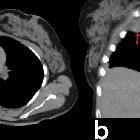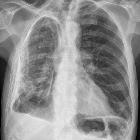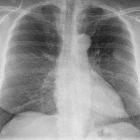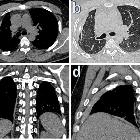Tuberculous pleuritis

Pleurosis
calcarea als Folge einer Pleuritis exsudativa im Rahmen einer Tuberculose mit deutlicher Volumenminderung der rechten Lunge im Vergleich zur Gegenseite.

Pleurosis
calcarea wohl nach Tbc. Auch links verkalkte Herde apikal, was sehr gut zur Tuberkulose passt.

Pleurosis
calcarea wohl nach Tbc. Auch links verkalkte Herde apikal, was sehr gut zur Tuberkulose passt.

Extrapulmonary
tuberculosıs: an old but resurgent problem. The chest X-ray (a) and coronal reformatted CT (b) image without contrast of a 4-year-old girl demonstrate unilateral pleural effusion in the right side (stars). Tuberculous pleurisy

Einseitige
Pleurosis calcarea nach Tuberkulose: Beachte auch die Verdickung der nicht verkalkten, parietalen Pleura.

Extrapulmonary
tuberculosıs: an old but resurgent problem. Transverse (a) and coronal reformatted (b) CT images without contrast of a 24-year-old female. A mass-like focal pleural lesion in the right side containing a few coarse calcifications is noted. The patient is diagnosed with TB on histopathologic assessment after surgical removal of the mass

CT findings
of high-attenuation pulmonary abnormalities. Empyema necessitans after tuberculous empyema. Axial CT shows a calcified pleural mass, extending the extrapleural structures at the right haemothorax (arrows)
Tuberculous pleuritis refers from inflammation of pleura due to infection by Mycobacterium tuberculosis. It is considered second most common form of extra-pulmonary tuberculosis . It may progress into a tuberculous empyema.
Epidemiology
It may be commoner in young males.
Pathology
In most cases, tuberculous pleuritis is believed to stem from either rupture of a subpleural granuloma into the pleural space or dissemination of the mycobacteria via pleural lymphatics.
Radiographic features
Imaging findings may vary dependent on stage / chronicity of disease. There is often pleural thickening and in certain stages, a pleural effusion may be present . Co-existing parenchymal lesions of tuberculosis may be observed a high proportion of patients (e.g. over 80% )
Siehe auch:
- Tuberkulose
- Pleuraerguss
- pulmonale Tuberkulose
- Pleuraplaques
- benigne pleurale Tumoren
- maligne pleurale Tumoren
- Pleuraplaques bei Asbestose
- primäre pleurale Tuberkulose
- chronic tuberculous empyema
- tuberkulöses Pleuraempyem
und weiter:

 Assoziationen und Differentialdiagnosen zu pleurale Tuberkulose:
Assoziationen und Differentialdiagnosen zu pleurale Tuberkulose:







